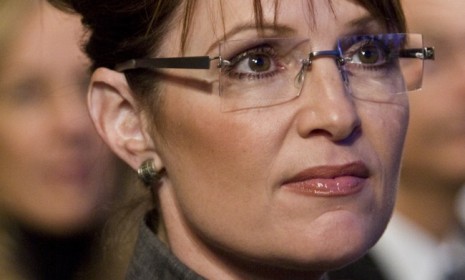4 lessons from the Sarah Palin email release
Now that the media has pored over 24,000 much-hyped pages of Mama Grizzly's emails, what has the whole affair taught us?

A free daily email with the biggest news stories of the day – and the best features from TheWeek.com
You are now subscribed
Your newsletter sign-up was successful
As news organizations finish scrutinizing 24,199 printed pages of Sarah Palin's emails covering the period from her December 2006 debut as Alaska's governor to her September 2008 national debut as Sen. John McCain's running mate, one thing's clear: No bombshells. But the emails do soften the frozen image people have of Palin, says The New York Times, by adding "nuance and depth." Or, as The Washington Post puts it, "vivid new color and fresh details." Is that all? Here, four lessons from the Palin emails:
1. They remind us why Palin was so popular pre-McCain
More than anything, this trove of correspondence reminds us that "once, there was a different Sarah Palin," a "popular, charismatic, competent woman of the people," says Molly Ball at Politico. The picture isn't "all rosy," but it's easy to see why the "touchingly authentic," pragmatic Palin had an 80 percent gubernatorial approval rating before she joined the McCain ticket. Then "her darker tendencies — defensiveness, thin skin, grudge-keeping — hardened into tics."
The Week
Escape your echo chamber. Get the facts behind the news, plus analysis from multiple perspectives.

Sign up for The Week's Free Newsletters
From our morning news briefing to a weekly Good News Newsletter, get the best of The Week delivered directly to your inbox.
From our morning news briefing to a weekly Good News Newsletter, get the best of The Week delivered directly to your inbox.
2. They reveal just how poorly Palin dealt with scrutiny
The emails also show that Palin became increasingly invested in curating her self-image during her stint as governor, say Sean Cockerham and Erika Bolstad in the Anchorage Daily News. In her early emails, she seems serious about being "open and transparent," and even showed a "desire to engage" with the press. But as the questions from reporters got tougher, she became more and more "engrossed with countering her critics," be they reporters, or even anonymous blog commenters.
3. The emails mostly confirm what we already knew
The emails will no doubt be invaluable to "future biographers of Sarah Palin and historians of the Aughts," says David Weigel at Slate. For the rest of us, they merely reinforce the picture of Palin that years of relentless reporting have painted. Are the few mockable "nuggets" worth all this expense and fuss, asks Patricia Williams in The Guardian. Not really: We didn't need 24,000 emails to confirm that she's "banal, hypocritical, and smug," or that she looks like a "paragon of virtue" next to sexting Rep. Anthony Weiner (D-N.Y.).
A free daily email with the biggest news stories of the day – and the best features from TheWeek.com
4. The whole affair proves Palin is right about the "lamestream media"
The emails aren't totally useless, since they prove that the press really does view Palin with "extreme hostility," says Thomas Lifson at the American Thinker. She is, after all, a "private citizen, and a candidate for no office," so the reporters who "minutely" combed her emails for gotchas did nothing but expose their liberal "political agenda." Life really is too short for such pointless obsessiveness, agrees Robert Stein at Connecting the Dots. But as far as the media's supposed political bias goes, note the press's constant, equally despicable hammering of the liberal Weiner. "Wake me when it's over."